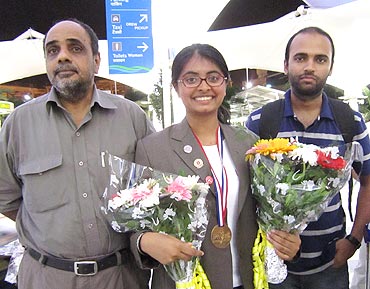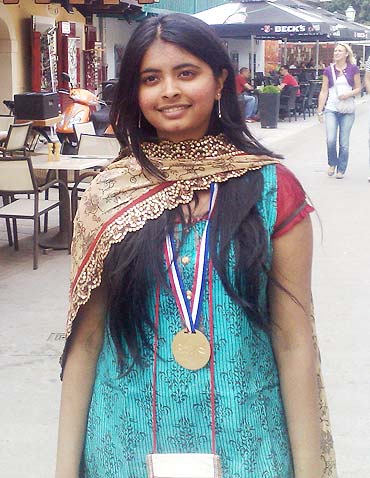
Aakanksha Sarda was recently in the news for standing 18th in the country at the IIT JEE examinations. [Click here to read how she cracked the JEE]
The Mumbai student is back in the spotlight again, this time for winning a gold at the International Physics Olympiad (IPhO, which was held in Croatia.
Sarda is the first Indian girl to achieve this feat -- she stood 12th among the 376 students from 82 countries and first among the girls.
In 2006, Neha Rambia was the first girl to participate in the Olympiad and had won a bronze medal.
The 18-year-old wiz beat over 40,000 students across the country to make it to Indian contingent. When she qualified, she also became only the second girl to represent the country.
Aakanksha Sarda tells us what it takes to be a champ and how she went about preparing for it:

How did you prepare for the International Physics Olympiad?
The preparations for IIT-JEE and International Physics Olympiad were similar, except that the latter is more advanced.
Besides attending the JEE coaching classes, I conducted extra experiments in my college (Sathaye College, Mumbai). The college had opened up its labs for me and since it is affiliated to the degree college too, I was able to conduct experiments that were meant for final year BSc students as well.
Then there was also a one-month special training programme at the Homi Bhabha Centre at TIFR (Tata Institute of Fundamental Research) in south Mumbai.
Was it difficult to balance your studies, IIT-JEE and Olympiad preparations?
Not really. You don't have to study all day and solve all problems -- least of all for the Olympaid. It isn't your regular exam. The IPhO requires creative problem solving.
What do you mean by creative problem solving?
In the theory part, you are given five hours to solve three questions. These are real life problems where you have to make assumptions and create a model to find a solution. It isn't like you have a formula and data and you simply plug the variables. You have to figure out how physics applies to it in the first place!
Can you give us an example of the questions you had to answer?
(One of the) problems we were given had to do with constructing the most efficient chimney for a furnace that emitted hot gasses. They had given us some basic guidelines but we had to calculate the specifications of the chimney. The second part of the problem was to make a solar power generator and calculate the efficiency of that. There was no direct application of what we had learnt through the years in physics. You had to think for yourself and come up with a solution.

What would you say have been the biggest challenges you've faced in these last two years?
My health was a major problem -- I suffered malaria thrice in the last two years.
But on a practical level, I realised that the experiment component in the Olympiad can pose a big challenge.
Unlike other countries that focus on lab skills equally, the Indian schooling system focuses a lot on theory. So I had to work on my experiments. In fact in the last two months leading to the Olympaid, I didn't do a lot of theory!
Thankfully my college had opened its labs for me and had even assigned a professor. The labs at Bhabha Centre are also well equipped, which helped. They've bought the latest apparatus from the organisers at IPhO and we had professors from across the country coaching us.
You mentioned in an earlier interview that you don't spend a lot of time studying. There are days when you don't touch your books at all! So what does it take to be a champ?
You simply have to enjoy what you are doing. Not everyone can be a champ in physics because not everyone loves physics. But if there is something you are really passionate about and like, you can very well be the best in it!
Can you offer five tips on how young students should beat stress?

What do you do when you aren't studying?
I enjoy reading and watching movies.
What kind of books and films?
With films I am not very choosy. I enjoy watching even the bad ones. But I quite like (Christopher Nolan's) The Prestige a lot.
Among books, I like reading chick lit -- Princess Diaries, Bridget Jones, Confessions of a Shopaholic are some of my favourite.
You mentioned in our last interview that you're planning to study at MIT. Is that on?
Yes it is. I will leave in a few weeks. I have one year to select my specialisation, which could be anything from pure sciences to humanities!
All the problems and their solutions since the first Physics Olympiad: www.jyu.fi/ipho/problems.html